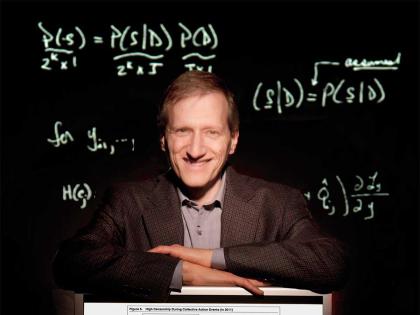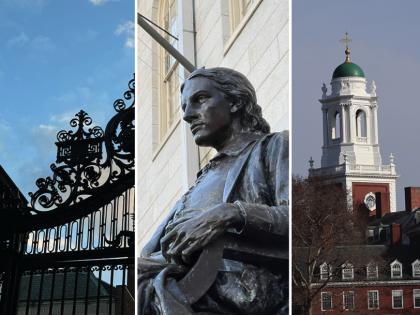Freshman to Freshmen
 |
| William C. Kirby |
| Justin Ide / Harvard News Office |
Chief Greeter's Good-bye
 |
| Richard M. Hunt |
| Photograph by Jim Harrison |
Economic Estimator
The newest member of the National Bureau of Economic Research's seven-person Business Cycle Dating Committee is N. Gregory Mankiw, Freed professor of economics. He thus becomes one of the official arbiters of periods of growth and recession. Mankiw succeeds Princeton's Ben S. Bernanke (now a governor of the Federal Reserve System), and joins two other Harvard colleagues on the committee: NBER president Martin S. Feldstein, Baker professor of economics, and Jeffrey Frankel, Harpel professor of capital formation and growth at the Kennedy School of Government.
Studying Sexual Assault
The committee created last spring to advise the provost and the dean of Harvard College on support services for victims of sexual violence, and on programs to reduce such assaults, began meeting in September. Professor of international health Jennifer Leaning, M.D., was appointed to chair the committee last May, following Faculty of Arts and Sciences approval of a new policy governing the evidence that must be presented to the Administrative Board before it agrees to hear such cases (see "Adjudicating Sexual-Assault Cases," July-August, page 81). Her colleagues are Diana Eck, professor of comparative religion and Indian studies and master of Lowell House; Sarah Bess Levit-Shore '03; Everett Mendelsohn, professor of the history of science; Elizabeth Studley Nathans, dean of freshmen; Katherine Park, Stone Radcliffe professor of the history of science and chair of the committee on degrees in women's studies; Maureen Rezendes, a psychologist at the University Health Services; Michael Rodriguez, lecturer on psychology and senior tutor of Adams House; Veronica Reed Ryback, clinical instructor in psychiatry and former director of Beth Israel Deaconess Medical Center's rape crisis center; Jared Slade '03; and James H. Ware, Mosteller professor of biostatistics, dean for academic affairs in the School of Public Health, and master of Cabot House. The committee's website is www.college.harvard.edu/services/leaningcommittee.
Nota Bene
Solid second. For the third consecutive year, U.S. News & World Report ranked Princeton the country's premier university, trailed closely by Harvard and Yale in a tie for second. As in years past, Harvard lagged slightly behind its two Ivy peers in the magazine's rankings of class size and student-faculty ratio. Five institutions were tied for fourth place: Cal- tech, Duke, MIT, Stanford, and the University of Pennsylvania. Dartmouth and Columbia (tied with Northwestern) rounded out the top 10.
MacArthur manna. Professor of history Ann M. Blair '84, a specialist in early modern European intellectual history, has been awarded a MacArthur Fellowship. The so-called "genius grants" provide $500,000 over a five-year period. Blair is currently researching the "information overload" associated with the introduction of printing. Paul H. Ginsparg '77, Jf '81, professor of physics and computing science at Cornell; MIT economist Sendhil Mullainathan, Ph.D. '98; seismologist Brian Tucker, M.P.A. '91; Paul O. Wennberg, Ph.D. '94, professor of atmospheric chemistry and environmental engineering at Caltech; and two novelistsJack Miles, Ph.D. '71, and Arch C. (Colson) Whitehead '91were also among this year's 24 fellows.
Pudding pleas. Suzanne M. Pomey '02 and Randy J. Gomes '02, charged with looting the Hasty Pudding Theatricals of nearly $100,000 (see "Underhanded Undergraduates, May-June, page 59), reversed their original not-guilty pleas on September 13. Even though prosecutors urged that both serve time in jail, they were sentenced to probation by Judge Peter W. Agnes Jr. on October 3.
 |
| Marjorie B. Cohn |
| Harvard Art Museums |
 |
| Russell Mills |
| Courtesy of Nieman Foundation |
ROTC reading. While debate continues over the terms of the relationship between Harvard and the undergraduate ROTC program (see page 72), cadets may now earn military credit for at least one College course. Government 1730, "War and Politics," will now fulfill the U.S. Air Force's sophomore military history requirement, simplifying students' classroom and travel burdens. Kaneb professor of national security and military affairs Stephen Peter Rosen told the Crimson the course would not be altered in any way to satisfy ROTC requirements.
 |  |
| Stuart M. Shieber | Steven E. Hyman |
| Jon Chase / Harvard News Office | Harvard News Office |
Politics prizes. At its annual meeting, held this year in Boston just before Labor Day, the American Political Science Association conferred awards on 21 scholars and professionals, including Linda Greenhouse '68, Supreme Court reporter for the New York Times, for journalism contributing to understanding of politics; Lars-Erik Cederman, Danziger associate professor of government, for a journal article; Daniel Carpenter, professor of government, for his book The Forging of Bureaucratic Autonomy; Michael Dawson, professor of government, for his book The Roots of Contemporary African-American Political Ideologies; and Sidney Verba, Pforzheimer University Professor, as coauthor of The Private Roots of Public Action: Gender, Equality, and Political Participation.








